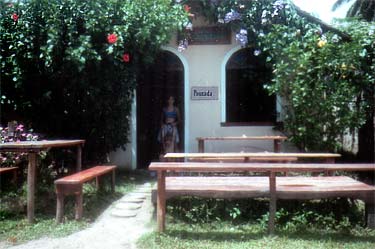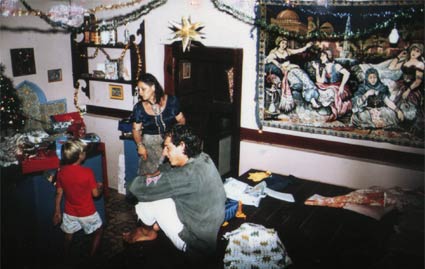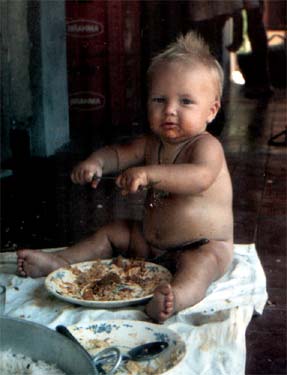| |
|
|
|
|
| |
|
|
|
| |
|
|
|
|
| |
|
Summer
was tourist season, awaited by the whole village because it was the
opportunity to earn some money. It was the same story every year. People
would say: The tourists will come in November. November came, but brought
only a few visitors. They'll come after the elections. They didn't. So it
was to be for Christmas. Or New Year. Carnaval, for sure. Soon summer had
passed, and people started to wait once again for next season's visitors.
|
|
|
| |
|
|
|
|
| |
|
|
For
more photos of the restaurant see the Pousada section |
|
| |
|
|
|
|
| |
|
A
great many of the houses located around the quadrado turned their
living rooms into tiny temporary restaurants during summer. They sold local
food, consisting of the unavoidable staple, rice and beans, with meat, poultry
or fish, and a small bowl of farinha. Farinha is rough, locally made
manioc flour, in looks and taste akin to sawdust, and is used either as
a topping for the beans, or eaten as a dry mix with pieces of fried meat,
vegetable or eggs as farofa. Blending it with bigger quantities of
liquids, like some spicy sauce, turns it into a rubbery mass called pirão,
known to me, though not by this name, from western Africa, where it used
to be one of my favorite dishes. |
|
|
| |
|
|
|
|
| |
|
|
|
|
| |
|
Christmas at the restaurant, with
Adilson |
|
|
| |
|
|
|
|
| |
|
The kitchen
was built exactly according to my requirements, with tables the correct
height to avoid the backache one gets when working surfaces are too low.
I had about 8 m² of working space all around my kitchen, so I just
could make a mess (I'm a pretty chaotic cook) and move on. Early morning
my helpers would come and clean up. My cooking range had six burners fed
from a gas cylinder and an electric oven. The electric workmanship wasn't
too sophisticated, I remember once getting hit by a very strong current
when touching the stove's surface: A live wire was in contact with the stove's
metal body. My blender gave me electric shocks as well, whenever the handcrafted
wooden tiles of the kitchen roof got displaced by the heavy rains, water
dripped into the appliance. |
|
|
| |
|
|
|
|
| |
|
Apart
from those minor inconveniences, I was only too happy with my big kitchen.
Its walls went only halfway up, so it was an open air affair actually, with
flowers growing in front and behind. The main passage to the garden and
the Pousada building was via the kitchen as well, so I usually had
some company. Friends came for a chat, neighbors appeared and the employees
consulted with me on construction matters while I prepared the restaurant
meals. |
|
|
| |
|
Even
at night my kitchen was a center of attraction: Thieves used to pay visits
to steal food from the fridge. |
|
|
| |
|
|
|
|
| |
|
|
|
|
| |
|
the
hard-to-please food tester for Michelin's Restaurant Guide on the job
|
|
|
| |
|
|
|
|
| |
|
Every day I prepared one different meal, anything from Arabian, Chinese,
Indian or Indonesian to Turkish or Tibetan, whatever I felt like doing and
could arrange for the necessary ingredients. The day's menu was announced
on a blackboard in front of the restaurant. My customers were part Brazilian
and foreign tourists and part expatriates living in Trancoso. Whenever possible,
background music reflected the cultural background of the food. Inevitably,
this led to some complaints by folks used to listen to nothing but Western
sounds, but I didn't care. It was my restaurant, after all. |
|
|
| |
|
I
also let it be known that resident devotees of Rajneesh (who later called
himself Osho), the infamous Indian sex guru, were not welcome at my place
wearing their uniform, the pink to dark-red habits and the mala,
the necklace with their leader's photo. I have to mention that one of the
first sights on our arrival in Trancoso was a group of those nuts. It made
me want to scream, turn round and run. |
|
|
| |
|
In India, those self-styled "sanyasins"
had crossed my path far too often for my liking. They made it impossible
for me to wear anything red, a colour I loved, for fear of being taken for
a member of their cult. Now my jewellery really doesn't look a bit like
those malas, but people just associated the fact that I did wear necklaces
and red colours with the followers of that unholy but very clever charlatan.
After being mistaken for one of that group a couple of times, I was so disgusted
I refrained from wearing red dresses. |
|
|
| |
|
For a time, there was a rumour about Rajneesh,
who had just gotten kicked out of India and was looking for a new place
to set up shop, thinking of buying the beach below Trancoso. This would
have forced us to nothing less than sell our property and move on. I would
never have consented to live in the midst of thousands of brain damaged
"sanyasins". We were lucky, Rajneesh moved his ashram, including
a few dozen Rolls-Royce limousines and some thousand followers and groupies,
to the States. An ideal choice at least for me, as I never have felt any
desire to visit the USA myself. For the guru himself, things turned sour
after a while and he even spent some time in an US jail. |
|
|
| |
|
|
|
|
| |
|
My
restaurant and pousada's name was the same as my web domain's: Gulab Mahal.
Gulab means rose, a Mahal is a palace. In reference to the famous Lale
(Tulip) Restaurant in Istanbul's Sultanahmet district, a Sixties' Hippie
hangout known world-wide as "Pudding Shop", I added "Restaurant
& Pudding Shop" to the sign out front. I love preparing colourful
deserts, so the name was apt for that reason as well. |
|
|
| |
|
|
|
|
| |
|
Many
necessary ingredients for Oriental cuisine weren't available in the vicinity.
I had to learn how to prepare tofu, paneer, sambal, chutneys
and achaar (Indian pickles) myself. From Nepal I had brought all
my recipe books along, so I didn't lack directions. Spices were scarce too,
so I planted some ginger and curcuma (both of the same plant families) in
the garden, and right besides the kitchen I had a big bush growing tiny
red and green super hot chilies all year round. |
|
|
| |
|
|
|
|
| |
|
In
season, we prepared five to seven liters of fresh yoghourt every day.
The rich politician who owned miles of the local beach kept a herd of
water buffaloes on his property. Knowing from my years in India that the
milk of water buffaloes makes for a far superior, richer and creamier
yoghourt than cow's milk, I arranged for buffalo milk being bought. This
yoghourt, blended with ice, sugar, and some pieces of fruit like mango,
resulted in a delicious lassi for both the restaurant guests and
ourselves. |
|
|
| |
|
During
Summer season I offered breakfast as well: Omlettes with herbs, Müesli,
yoghourt with fresh fruit and the like. |
|
|
| |
|
|
|
|
| |
|
|
|
|
| |
|
the
Mexican Taco Man |
|
|
| |
|
|
|
|
| |
|
For
a while we even had a taco stand run by a Mexican in front of the restaurant.
I can't remember that fellow's name, our business agreement was that he
prepared the tacos, we supplied the infrastructure plus ingredients, profits
were shared. This Mexican was a friendly enough dude, but my employees didn't
like his habit of treating our fridge as he would his mother's: He ate whatever
he fancied, all day long. The kitchen helpers had lunch with us as well,
but they wouldn't have thought of raiding the fridge for desserts that might
be intended for the restaurant, they'd ask me first. Meanwhile the Mexican
got visibly fatter by the day. I couldn't really be angry with him, obviously
he felt at home with us, but for justice's sake, I had to reprimand him
often. |
|
|
| |
|
|
|
|
| |
|
A
great bonus of life in Trancoso was fish so fresh I was afraid it might
still twitch its tail. Early in the mornings the call: "Peeeeeeeeeixe.............
peeeeeeeixe" could be heard. Often still in my nightgown, I'd hurry
out to the village green, where the fishermen had thrown their catch to
be snapped up quickly by housewives and restaurant owners. |
|
|
| |
|
Fresh
fish just isn't comparable to what's on offer in shops and supermarkets.
Right after returning to Switzerland with my youngest, who'd loved fish
in Brazil, we passed the fish counter at the local mall. The smell was so
nauseating to him that he never again, up to this day, ate fish. |
|
|
| |
|
For
Rashid and the kitchen helpers, the most coveted part of the fish usually
was the head, often worth a fight and a chase around the kitchen to them.
|
|
|
| |
|
|
|
|
| |
|
I
enjoyed running my little restaurant, I could cook to my heart's content,
and my efforts were rewarded not only with praise, but with a bit of cash
as well. |
|
|
| |
|
|
|
|
| |
|
|
|
|
| |
|
|
|
|
| |
|
|
|
|
| |
|
|
 |
|







